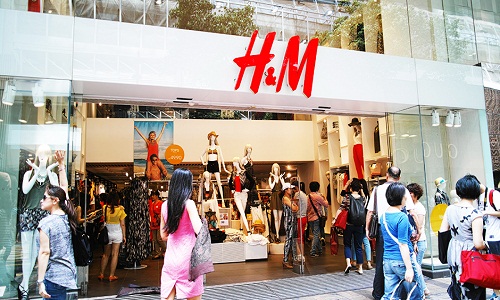"A recent investigation has revealed the factories supplying material for garments to H&M, Asda, Next and Tesco are leaking toxic chemicals into rivers and environment. A report by campaign group, the Changing Markets Foundation says villagers in the area around a plant in India told investigators about cases of cancer, tuberculosis, reproductive problems, birth defects and stomach disorders. Investigators reported ‘visible and strong-smelling’ pollution, which had turned water dark red at multiple sites surrounding the plant in India, which supplies viscose."

A recent investigation has revealed the factories supplying material for garments to H&M, Asda, Next and Tesco are leaking toxic chemicals into rivers and environment. A report by campaign group, the Changing Markets Foundation says villagers in the area around a plant in India told investigators about cases of cancer, tuberculosis, reproductive problems, birth defects and stomach disorders. Investigators reported ‘visible and strong-smelling’ pollution, which had turned water dark red at multiple sites surrounding the plant in India, which supplies viscose.
An independent lab test of air samples taken outside Aditya Birla’s plant by the investigation team found the level of carbon disulphide, a toxic chemical used in viscose production was 125 times the World Health Organisation limit. Natasha Hurley, Campaign Manager, Changing Markets says workers inside the factory may have been exposed to far higher levels of carbon disulphide because the chemical is highly volatile, meaning that it quickly breaks down when exposed to air. The compan has denied all allegations.

With so much noise around evading norms, the plant was temporarily closed down by local authorities after 11 villagers were rushed to hospital with suspected carbon monoxide poisoning because of the factory. To support the company’s claim that it was appropriately treating run-off from the plant, the company supplied a photo of a plaque marking the opening in 1985 of an effluent treatment plant. But for the investigation agency, that’s not a solid proof. The company needs to show that they are properly measuring these chemicals, as well as the results of that monitoring and how that information is being shared with the authorities.
Changing Markets’ findings about the Nagda plant are supported by a local study by the Indian Institute of Soil Sciences which found effluents from the industrial area may have contaminated the Chambal River and the groundwater in nearby villages. Paul Roeland from the Clean Clothes Campaign demanded full transparency along the supply chain, coupled with proper inspections to begin to solve the problem. He said that due diligence on environmental and social protection is not an optional luxury but a fundamental duty of brands, suppliers, and investors, wherever production takes place.
Retailers take the sustainability pledge
To resolve the issue, Changing Markets has produced a roadmap for the industry with a series of steps to ensure that viscose production becomes more sustainable. After these allegations were flagged off to fast fashion retailers such as H&M, Asos, and Inditex, they pledged to meet the commitments contained in the roadmap which include mapping the full supply chain and ensuring regular, independent environmental checks. Asos says the company was committed to addressing the issue with our sustainable sourcing and environmental policies and by engaging with our suppliers to transition to closed-loop production. H&M officials also said they fully agree with Changing Markets on what actions need to be taken within the viscose production process. The company had signed up to the roadmap produced by Changing Markets to lessen the environmental impact of the industry and is accelerating its use of sustainable viscose alternatives. Next highlighted the issues are both complex and real and therefore, cannot be solved by any single party acting alone. Next is therefore seeking to join with others in the retail sector to work collaboratively on a long-term solution.












